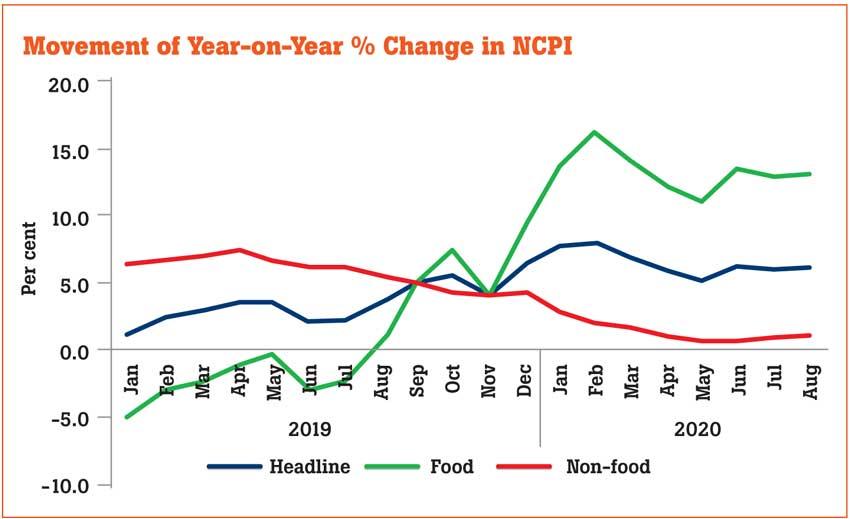22 Sep 2020 - {{hitsCtrl.values.hits}}

Prices at national level trended up during August, as the prices of food items and to a lesser degree the prices of non-food items rose, albeit the average prices at the broader economy still remain largely benign.
Inflation measured based on the National Consumer Price Index (NCPI), which captures the prices across the island inched up to 6.2 percent during the 12 months to August, up from 6.1 percent in July, with the most impact stemming from food prices, as the prices of vegetables, turmeric powder and coconuts increased substantially from a month earlier and also from a year earlier, barring the vegetables.
In comparison, the prices in the mainly urban Colombo district rose by 4.1 percent in the same month from a year ago, easing from 4.2 percent in the month earlier.
The NCPI-based inflation comes typically with a 21-day lag from the Colombo Consumer Price Index (CCPI).
The food prices rose by 0.5 percent in August from July, compared to a 0.3 percent contraction in prices in the month earlier, as the increases in the prices of vegetables, turmeric, coconuts, big onions, fresh fruits, eggs and a few others outweighed the price declines in coconut oil, limes, red onions, potatoes, rice, fresh fish, dry fish and a few other categories.
Meanwhile, on a year-on-year basis, food prices rose by 13.2 percent in August, accelerating from 12.9 percent recorded in July. The prices of vegetables were believed to have risen due to supply-side disruptions caused by the adverse weather while the price of turmeric remains elevated as imports remain banned, as local production is yet to make up for the total domestic demand.
A kilogramme of turmeric powder was sold in the retail market at Rs.2,933.33 in the last week of August, compared to Rs.667.03 a kilogramme a year ago.
The retail price of a coconut ranged from Rs.64 to Rs.84, depending on the size, compared to Rs.39 to Rs.54 a nut a year ago. Demand for coconut has increased from companies engaged in kernel product exports, creating some gap in the local market, as coconut and coconut-related product exports saw some notable increase in the months following the pandemic. Meanwhile, the non-food inflation rose by 0.3 percent in August from July, unchanged from the increase in prices between June and July, while the prices rose by 1.1 percent on a year-on-year basis, accelerating from 1.0 percent in July. While the prices of arecanuts and betel leaves led the increase in the prices of the subcategory identified as ‘alcoholic beverages, tobacco and narcotics’, a decline in the payments for medical laboratory tests under the ‘heath subcategory’ largely softened the overall impact.
Meanwhile, there were slight increases in the prices of categories of recreation and culture, restaurants and hotels and furnishing, household equipment and routine household maintenance, demonstrating that people are dining out and going on vacations.
The core inflation measured barring the effects of the often volatile items such as food and energy at national level increased to 4.6 percent during the 12 months to August, from 4.5 percent in July. The Central Bank expects the prices to remain broadly subdued until mid-2022, until the measures taken to stimulate the economic growth and the normalisation of global oil prices start exerting some upward price pressure.
18 Nov 2024 1 hours ago
18 Nov 2024 3 hours ago
18 Nov 2024 3 hours ago
18 Nov 2024 4 hours ago
18 Nov 2024 8 hours ago